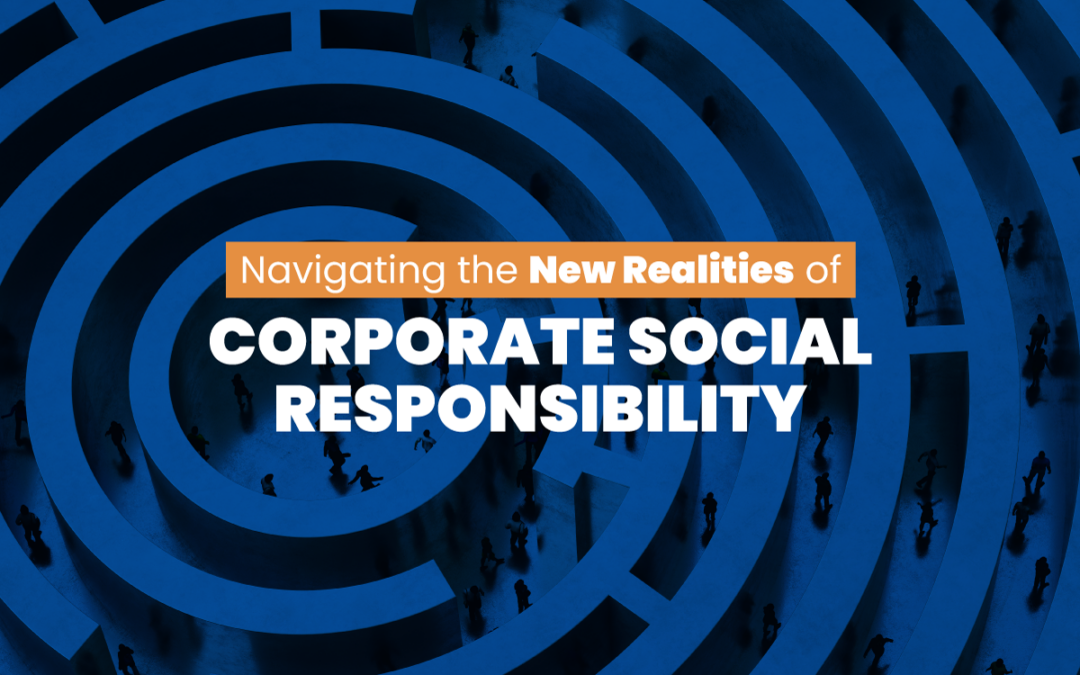On August 22, I will present a session at the AFP NC Philanthropy Conference on one of my favorite topics: corporate social responsibility. The session will continue a decade-long series of talks I’ve given at this annual conference.
Our company has done a significant amount of research on this topic, which informed the launch of our corporate impact services line. Now, Next Stage works with multiple private-sector companies to realize compelling public-private partnerships. It’s some of the most innovative and game-changing work our company has done.
Helping nonprofit organizations understand what has changed about corporate social responsibility requires near-constant updating because so much has changed — and continues to change — so quickly, which is why we’ve found it important to share our latest findings regularly.
Alignment to Materiality
As we previously shared in our 2023 report, Profit & Purpose: The ESG Addendum, the speed with which corporate social responsibility has been evolving has accelerated in recent years. A more sophisticated methodology for social impact efforts has replaced the shotgun approach of previous decades. “Spreading it around” has given way to something more strategic.
That approach is part of what I’ll unpack in greater depth at the conference next month. Companies are focusing their impact efforts on areas of greater alignment to their work, often to mitigate unintended negative consequences of their operations. This concept, for companies to choose social issues aligned to their business processes, is called materiality. For example, a residential home builder is likely to focus on social impact efforts related to affordable housing, while a lending institution may work to create more racially equitable access to capital.
If you’re curious about what a company considers its materiality, take a look at its ESG report. Delta Airlines’ report, for example, suggests that climate change is an area of particular focus — not surprising given that the aviation industry is responsible for 2–3% of total carbon emissions annually. A deeper dive into the report reveals that education and equity are also key areas of focus, with the need for a future STEM-based workforce critical to the company’s future success.
Metric-Based Goal-Setting
One way the private sector and nonprofits have come closer together in recent years is how they are evaluated. Like the nonprofits they have granted funding to for years, companies are now compiling their impact data and making it available to third-party reviewers for assessment. Why? Because future backing from socially conscious investors hinges on how those outcomes stack up against others in their industry.
The Lowe’s Foundation Gable Grant program is a $50 million, 5-year program to train 50,000 job-ready skilled tradespeople. Beyond the stated financial commitment and multiyear design, the effort is also carving out a specific and measurable goal of 50,000 people served. The grantmaking strategy includes investing in national-level nonprofits, technical and community colleges, and community-based organizations nationwide, recognizing the importance of working at macro and micro levels to affect change. It’s an advanced approach to grantmaking that was not very common in the past. (Disclosure: Next Stage is helping the Lowe’s Foundation to implement this innovative initiative).
Commitment to Research
The history of corporate social responsibility is one without much grounding in research. Companies often decided to support issue areas based on internal decision-making, and organizations were selected as much on their social capital (e.g., board connections to corporate executives) as on the merits of their programming. That framework has largely disappeared, with far more evidence-based approaches to grantmaking becoming more of the norm.
The PNC Foundation was ahead of the curve when it launched its Grow Up Great initiative — an effort to prepare children from birth through age 5 for success in school and life — in 2004. As the PNC Foundation celebrates its 20th anniversary this year, it’s positioning its grantmaking against the backdrop of research that indicates an area where its impact can be particularly effective. PNC-funded research, in partnership with the National Institute for Early Education Research, is helping to reframe the need for more nature-based play and learning environments.
Leveraging Grantee Connectivity
One area where Next Stage has been pioneering new social impact efforts is in the development of digital communities of practice for corporate foundations seeking to better harness their portfolios of investees. Companies have changed how they treat the nonprofits and agencies they support, from seeing them as charitable investments to vendors of corporate-aligned social impact. As such, realizing stronger outcomes collectively is a top priority.
Next Stage has developed an approach to building social cohesion among grantee organizations that increases the potential for collaboration. Working together, grantees convened by a single corporate grantmaker may be able to realize more impact than when working in isolation.
Next Stage uses a digital collaboration management platform called Cultivate Impact ® to unite grantee organizations, often through the lens of professional development and organizational strengthening. We have built a curriculum to support grantee learning communities that leads to stronger relationships, deeper trust and increased impact.
Want to learn more? Feel free to get in touch! We’d welcome the opportunity to discuss our approach further.
